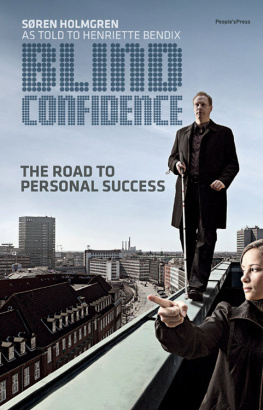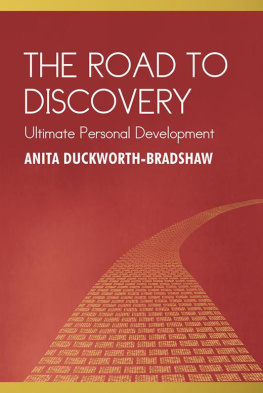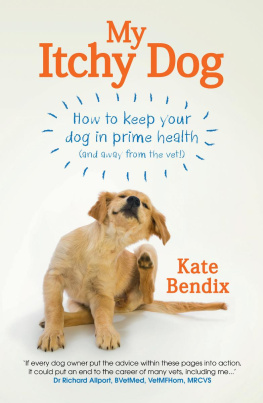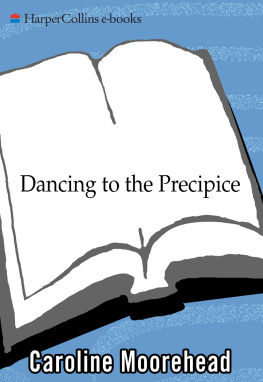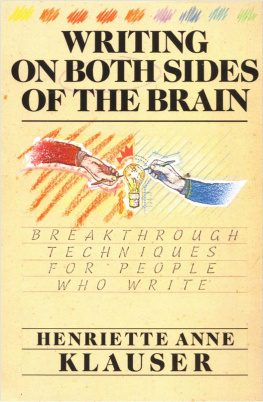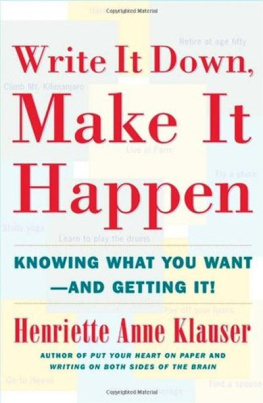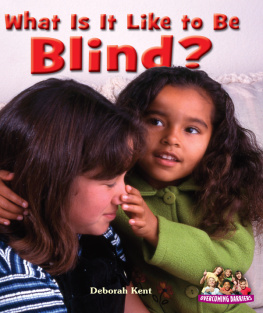Bendix Henriette - Blind confidence: the road to personal succes
Here you can read online Bendix Henriette - Blind confidence: the road to personal succes full text of the book (entire story) in english for free. Download pdf and epub, get meaning, cover and reviews about this ebook. City: Peoples Press, year: 2009, publisher: Peoples Press, genre: Home and family. Description of the work, (preface) as well as reviews are available. Best literature library LitArk.com created for fans of good reading and offers a wide selection of genres:
Romance novel
Science fiction
Adventure
Detective
Science
History
Home and family
Prose
Art
Politics
Computer
Non-fiction
Religion
Business
Children
Humor
Choose a favorite category and find really read worthwhile books. Enjoy immersion in the world of imagination, feel the emotions of the characters or learn something new for yourself, make an fascinating discovery.
- Book:Blind confidence: the road to personal succes
- Author:
- Publisher:Peoples Press
- Genre:
- Year:2009
- City:Peoples Press
- Rating:3 / 5
- Favourites:Add to favourites
- Your mark:
- 60
- 1
- 2
- 3
- 4
- 5
Blind confidence: the road to personal succes: summary, description and annotation
We offer to read an annotation, description, summary or preface (depends on what the author of the book "Blind confidence: the road to personal succes" wrote himself). If you haven't found the necessary information about the book — write in the comments, we will try to find it.
Blind confidence: the road to personal succes — read online for free the complete book (whole text) full work
Below is the text of the book, divided by pages. System saving the place of the last page read, allows you to conveniently read the book "Blind confidence: the road to personal succes" online for free, without having to search again every time where you left off. Put a bookmark, and you can go to the page where you finished reading at any time.
Font size:
Interval:
Bookmark:
Sren Holmgren
- as told to Henriette Bendix
BLIND CONFIDENCE
THE ROAD TO PERSONAL SUCCESS
PeoplesPress
Anna and Isabella, I see you every day and you melt my heart. You bring me untold joy and inspiration!
Nadia, you and the girls are the most important part of my life never forget that!
Stine, youve shown me that some people help others with no thought of personal gain. You are a very beautiful person!
Anders, thanks for seeing possibilities and potential. Also big thanks to Catrine.
Mark, I have a deep respect for what youve achieved in your life! Lets stay in touch!
Henriette, without you, this book had stayed behind the eyes. Thanks for being who you are!
Preface
Im often asked how I manage to stay cheerful, and many people would like to know where I find motivation and from which strategy my results derive.
And then there are all those people who want me to guess how many fingers they hold up before me.
These are all quite natural questions, since few people can imagine how you can stay happy, outgoing, and ambitious and maintain your drive as a blind person.
This book answers those questions, and more.
It is my hope to pass on to others that ones attitude and approach to life are prerequisites for results. Even if the prospects may not seem too bright.
Of course, everything I do contains an element of my lack of sight, and there will consequently be situations, scenarios and stories that bring the reader a unique insight into a world unknown to most people.
Besides giving you an impression of a world without eyesight, the book contains specific tools which are useful, both in your private and professional life also to people with 20/20 vision.
Its my hope that readers will be inspired by my way of handling life and thereby gain a desire and courage to work with the tools provided by my book. At any rate, I hope that readers will be entertained and may enjoy seeing the world as I see it.
I wish you a good reading!
Introduction
One day when I was seventeen, I was playing Yatzy with my mother. We used to play a lot of games, my mother and I, cards and dice, and every once in a while, a dice was bound to fall on the floor. It happened on this day, too, and I went down to pick it up. But I couldnt find it. I searched and searched, but it was gone.
From her place at the table, my mother could clearly see the dice and also that it was right in front of me, even between my hands, and yet I couldnt see it. This worried my mother, and she told me to go see an eye specialist. I had been before.
There were a lot of people in the waiting room, and when it was my turn, I sat down in the consultation, and the doctor subjected me to the usual eye chart. I was to read aloud from the letters I saw on the lit screen in front of me. It went okay, but when I told her about the dice, she held up some fingers in front of me and asked me how many there were. I couldnt see them, so I asked her where they were. At first she thought I was kidding, but when she realized that I actually couldnt see the fingers, she got worried.
The doctor decided to test my eyesight differently, so she placed me in front of a wall with a big, black felt circle with a white spot at its centre.
I was asked to sit in front of the circle and focus on the white spot. The ophthalmologist took a flashlight and started to lead the cone of light towards the white spot and asked me to tell her when I saw the light. She asked me several times to let her know when I saw the light, and I kept telling her that Id let her know, she should just go ahead. Little did I know that she was already at it, and it turned out that I couldnt see the light before it almost covered the white circle. Thats when the poor condition of my eyesight dawned on the doctor, and she was shocked that she hadnt found out in all the time I had consulted her.
It is characteristic of my disease that the sight first disappears in the peripheral field of vision and then, after some time, the eyesight is like looking through a tube. Thats what tunnel vision is like. The ophthalmologist hadnt found out because I could see the letters on the eye charts where the conditions were optimal, the chart being right in front of me and even well lit. It was just that my peripheral vision had never been checked.
When the doctor had finished her examination, she told me that we had to have a serious chat about my eyesight. For some reason we couldnt stay in the consulting room, so she ushered me into the kitchen, but as there were contractors at work there, I was propelled into the waiting room, which was full of patients, so eventually, we ended on the staircase.
Here she told me that I suffered from Retinitis Pigmentosa (RP). Without further ado, she informed me that my eyesight was alarmingly poor and that I would go blind, but I shouldnt worry because she would call my mother and contact the Institute for the Blind and Visually Impaired. And then she left.
RP is the collective appellation for a series of rare eye diseases which often hit teenagers or young adults. The disease develops throughout ones lifetime and usually, the eyesight deteriorates gravely some time in the late teens to the early thirties. As in my case, it often ends with an extremely poor eyesight. The specialists cant say how quickly the eyesight declines, and as I am today, I can only sense light and darkness.
When I think back, I can tell that my eyesight is much more reduced now, but it has been my luck that Ive managed to adapt and adjust my way of handling things as my eyesight disappeared.
I didnt know that at seventeen when I stood in the ophthalmologists stairwell with a booming emptiness inside, unable to relate to the message I had just received. It was tough news to be left alone with; I was somewhat confused and probably in shock. I remember looking around without grasping the consequences just presented to me by the doctor. It sounded all wrong, for I wasnt blind, was I? I could see the window and the elevator. Whatever did she mean? I didnt know that everybody else saw much more than I did.
When I had stood there for a while, I went down to catch a bus home, and when I looked around on the way, it suddenly struck me that she might be right. There were actually a lot of things I couldnt do, which all my friends could do quite easily, but I still couldnt comprehend that I was going blind. Thoughts were swirling around my head. What was I to do? How would I be able to live my life?
When I got home and told my mother what had happened, she was all cut up. She had sent me off to the eye doctor, and an hour later I came back blind. I believe thats how she saw it. In the beginning, I actually think she took it harder than I did. RP is a hereditary disease and she may have felt responsible in some way for being the carrier. It was believed that my grandfather had also suffered from RP, even though my grandmother refused to accept that there was anything wrong with his or my eyesight.
In the time that followed I became increasingly aware that my bad eyesight was the reason that I had been different from my friends. I could suddenly understand why they were so much better at ball games and why they could slalom on their bikes among cones; all the things I was poor at, but did anyway. It was actually a positive experience to find an explanation, but at the same time very traumatizing, of course.
As she had promised me, the ophthalmologist put me in contact with the Institute for the Blind and Visually Impaired where I was registered in a hereditary file so they could trace whether I had inherited the disease from my grandfather. There are many ways to pass this thing on, and the illness may be bound to the X or Y chromosome, recessive or dominant. Mine was bound to the X chromosome.
Next pageFont size:
Interval:
Bookmark:
Similar books «Blind confidence: the road to personal succes»
Look at similar books to Blind confidence: the road to personal succes. We have selected literature similar in name and meaning in the hope of providing readers with more options to find new, interesting, not yet read works.
Discussion, reviews of the book Blind confidence: the road to personal succes and just readers' own opinions. Leave your comments, write what you think about the work, its meaning or the main characters. Specify what exactly you liked and what you didn't like, and why you think so.

